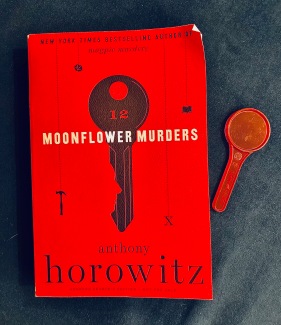 Anthony Horowitz’s Moonflower Murders is in many ways a homage to the Golden Age of mystery novels. It also contains a mystery within a mystery–an entirely separate novel written by a fictional author named Alan Conway featuring a detective named Atticus Pünd. This aspect of the novel is where Horowitz is most indebted to Agatha Christie. Pünd is clearly inspired by Poirot and the story features all the hallmarks of Christie’s style, including the final big reveal where the detective gathers all the suspects together and informs them of the solution.
Anthony Horowitz’s Moonflower Murders is in many ways a homage to the Golden Age of mystery novels. It also contains a mystery within a mystery–an entirely separate novel written by a fictional author named Alan Conway featuring a detective named Atticus Pünd. This aspect of the novel is where Horowitz is most indebted to Agatha Christie. Pünd is clearly inspired by Poirot and the story features all the hallmarks of Christie’s style, including the final big reveal where the detective gathers all the suspects together and informs them of the solution.
The protagonist of Moonflower Murders is Susan Ryeland, a former literary editor who runs a hotel in Crete with her long-term boyfriend. Susan left publishing and London under difficult circumstances having to do with the murder of Alan Conway, whose novels she edited. As the novel begins, the Trehernes–an English couple– arrive at her hotel and ask her to come to the Suffolk countryside to investigate the disappearance of their daughter Cecily. They approach Susan because Cecily had been reading Atticus Pünd Takes the Case (the third novel in Conway’s fictional series) and believed that it contained clues to the solution of a murder that occurred at the Treherenes’ hotel several years ago. Her parents believe that since Susan edited Conway’s work, she is best placed to investigate Cecily’s disappearance.
The novel proceeds very much like a traditional country house murder story. Susan arrives at Branlow Hall and proceeds to interview all those who were there during the first murder ( which occurred during Cecily’s wedding weekend) as well as all those who could possibly be linked to Cecily’s disappearance. Along the way, she also reads Conway’s novel and thus readers have the pleasure of immersing themselves in not one but two whodunits.
I don’t want to give away any spoilers but I must comment on one aspect of the novel which can be seen as problematic. The murder victim in the Branlow Hall case was openly gay and involved with rent boys. One of the suspects is also a former rent boy. While there is nothing wrong with including these elements as part of the plot, the way that Horowitz does so comes off as a bit homophobic. Since the only gay characters in the novel are involved in what many would consider a sordid lifestyle, the novel can be seen to be playing into negative stereotypes surrounding homosexuality. While this was probably not Horowitz’s intention, I wish he had moved beyond the cliched representation of homosexuals as promiscuous and engaged in deviant sexual practices. This portrayal seems regressive for a novel published in 2020 and set in England just a few years prior to that.
Despite this criticism, I enjoyed Moonflower Murders overall and would recommend it highly to fans of mysteries, especially those of Agatha Christie.